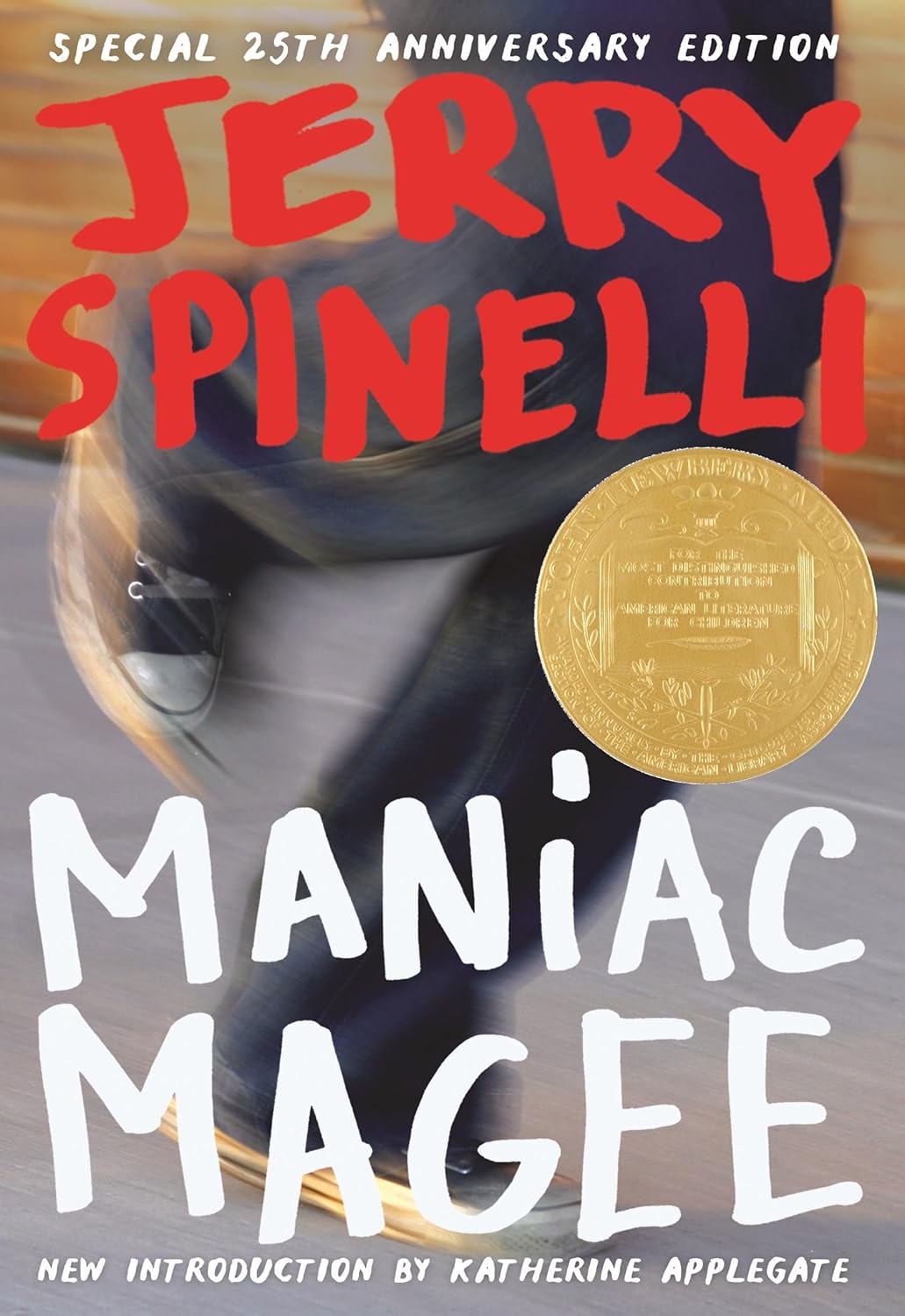
Maniac Magee
Chaper 24
by Spinelli, JerryThe chapter begins with Maniac Magee and Grayson returning to the band shell after finishing their snack. Grayson humorously remarks about quitting a job he never started, and Maniac eagerly asks about dinner. They head to a diner, where Grayson watches Maniac devour a hearty meal while he sips coffee. The scene sets a tone of camaraderie, with Grayson’s gruff exterior contrasting with Maniac’s youthful enthusiasm. The diner becomes a backdrop for deeper conversations, hinting at the growing bond between the two characters.
During dessert, Grayson abruptly questions Maniac about whether Black people eat the same foods as they do, revealing his lack of exposure to other cultures. Maniac, surprised by Grayson’s ignorance, patiently explains that the Beale family, who once took him in, ate the same meals and lived similarly to anyone else. Grayson’s persistent questions—about toothbrushes, shared glasses, and household items—highlight his ingrained prejudices and curiosity. Maniac’s responses challenge Grayson’s assumptions, subtly addressing themes of racial equality and shared humanity.
After dinner, Grayson tentatively invites Maniac to stay at his place instead of sleeping on the hard floor of the equipment room. Maniac, touched but wary of forming attachments due to past disappointments, declines and redirects the conversation by asking Grayson to share his life story. Grayson resists, claiming he has no story, but Maniac playfully insists, teasing out details about Grayson’s job and preferences. Their banter reveals a mutual affection, blending humor with moments of vulnerability.
The chapter closes with Grayson reluctantly admitting he once dreamed of becoming a baseball player, a fleeting glimpse into his unfulfilled aspirations. The exchange underscores the loneliness and unspoken regrets in Grayson’s life, while Maniac’s persistence reflects his desire to connect. The scene ends on a poignant note, with Grayson turning off the light and leaving, leaving readers to ponder the complexities of their relationship and the themes of isolation and belonging.
FAQs
1. How does Grayson’s conversation about the Beale family reveal his racial prejudices and limited life experiences?
Answer:
Grayson’s series of questions about whether Black families eat mashed potatoes, use toothbrushes, or share glasses demonstrates his deep-seated racial prejudices and lack of exposure to diverse communities. His shock at learning that the Beales’ household habits mirror his own (“Ain’t that something…”) underscores his sheltered worldview. The chapter highlights how segregation and lack of interracial relationships have fostered Grayson’s ignorance, making mundane aspects of Black family life seem extraordinary to him. Maniac serves as a bridge, patiently explaining that the Beales are “just regular people,” challenging Grayson’s assumptions through firsthand accounts.2. Analyze the significance of Grayson’s offer to let Maniac stay at his place and Maniac’s refusal. What does this reveal about both characters?
Answer:
Grayson’s hesitant offer (“maybe you want to come over to my place”) shows his growing care for Maniac, overcoming his usual isolation. His foot-tapping excuse about the hard floor reveals emotional vulnerability. Maniac’s refusal, while pretending the gear makes a comfortable bed, stems from his fear of parental abandonment (“bad luck with parents”). This interaction highlights Grayson’s tentative steps toward connection and Maniac’s self-protective independence. Their mutual care is evident in how Grayson accepts the refusal without pressure and Maniac quickly shifts to asking about Grayson’s life to spare his feelings.3. How does the “bedtime story” exchange develop the theme of identity in this chapter?
Answer:
When Maniac insists “everybody has a story,” he challenges Grayson’s self-dismissal (“I ain’t nobody”). Grayson initially defines himself only by his job (“I work at the park”), but Maniac pieces together a fuller identity from small details (liking Krimpets, living at the Y). The revelation that Grayson once dreamed of being a baseball player adds depth to his character, suggesting unfulfilled aspirations beneath his gruff exterior. This mirrors Maniac’s own search for identity and belonging, creating parallel journeys where both characters help each other see their lives as meaningful narratives rather than isolated facts.4. What literary devices are used in the “worm in Grayson’s head” metaphor, and what purpose does it serve?
Answer:
The “worm” metaphor uses visceral imagery (progressing from “tiny tickle” to “maddening itch”) to illustrate Grayson’s growing compulsion to connect with Maniac. This extended metaphor suggests his thoughts are involuntary and persistent, emphasizing how unusual this bond is for the typically solitary man. The description of the worm exiting “by only one route, the mouth” foreshadows Grayson’s hesitant invitation. This creative figurative language makes an internal emotional process tangible, showing how Maniac is disrupting Grayson’s habitual isolation against his usual instincts.
Quotes
1. “Grayson was joking, but Maniac was serious when he piped, ‘Great! Where to?’”
This quote captures the contrasting personalities of Grayson and Maniac, showing Maniac’s earnestness and eagerness for connection, which contrasts with Grayson’s more reserved nature. It sets up their evolving relationship dynamic.
2. “‘Grayson, they’re just regular people, like us.’”
This pivotal moment shows Maniac challenging Grayson’s racial prejudices by sharing his firsthand experience living with the Beales. It represents the chapter’s theme of breaking down stereotypes and recognizing shared humanity.
3. “‘You didn’t drink out the same glass.’ ‘Absolutely, we did.’ This information seemed to shock the old man.”
This exchange powerfully illustrates the depth of Grayson’s racial biases and how Maniac’s lived experience contradicts them. The physical act of sharing glasses serves as a potent symbol of equality that surprises Grayson.
4. “The grizzled, gray old parkhand could never know how much Maniac was tempted, or how deeply the offer touched him.”
This insight reveals Maniac’s internal conflict between his desire for connection and his fear of attachment due to past traumas. It shows the emotional complexity underlying their relationship.
5. “‘A baseball player,’ he said. He turned out the light and closed the door.”
Grayson’s simple revelation about his childhood dream and the poignant closing action create a powerful ending to the chapter, hinting at unfulfilled dreams and the beginning of their meaningful connection.
